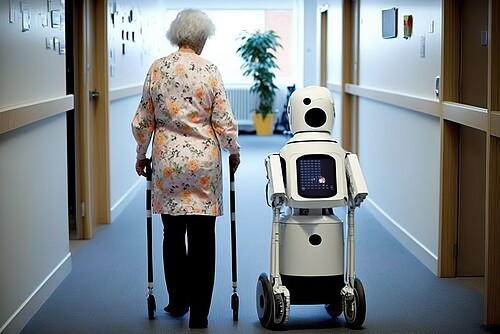
More flexible planning, less exhaustion
If healthcare professionals are unable to recover sufficiently, this not only impacts their personal well-being, but also has a significant effect on the quality of care they can provide. Simple measures such as more flexible shift planning could ease the strain placed on them.
They rush from patient to patient, from bed to bed and from shift to shift. Coffee breaks are cancelled and overtime piles up. This situation is a reality for many healthcare professionals. A reality that has also been depicted in studies for many years, including the recently published report of the Women in Global Health (WGH) movement entitled “The Great Resignation – Why Women Health Workers Are Leaving.” This report speaks of a global health emergency, as the predominantly female professionals who work in this sector are wearily giving up their vocation. In the US alone, around one in five nurses are intending to leave the healthcare sector by 2027. According to the WGH, the coronavirus pandemic has further fuelled this exodus: it was reported that female health professionals, in particular, found themselves under extreme stress and also had to bear the additional burden of unpaid care and domestic work.
Training offensive aiming to help
Even before the outbreak of the pandemic, however, many healthcare professionals were already running on fumes, including in Switzerland. Surveys conducted by the Unia trade union in 2019 revealed that 86 percent of the nursing staff questioned felt tired and burnt out. Politicians are aware of the problem, at least with respect to nursing care: from mid-2024, the shortage of skilled workers in this sector is to be combated with a training offensive as part of the nursing initiative adopted in 2021. However, it is likely to take years for this campaign and other measures under the initiative to take full effect.
Magnet hospitals show the way
So what can be done to prevent even more nurses leaving the profession due to exhaustion before then? Answers to this question can be found, for example, in hospitals that are particularly attractive as employers. According to Maria Schubert from the ZHAW Institute of Nursing, these so-called magnet hospitals are characterised by an appropriate staffing ratio and a working culture “in which nurses have a voice and people look out for one another.” On the one hand, this means autonomy and interprofessional collaboration on an equal footing. On the other, it means that “management regularly takes the pulse of its employees in terms of their workload.”

“In most hospitals, however, planning is very rigid and takes little account of individual needs.”
Work scheduling can also make an important contribution to helping employees recover better. In 2018, a study in which Maria Schibert was involved showed that more flexible planning can ease the emotional exhaustion experienced by hospital nursing staff. “In most hospitals, however, planning is very rigid and takes little account of individual needs,” explains Schubert. She is convinced that with the technological resources we now have at our disposal, planning could be made much more flexible and be better tailored to people’s requirements. “Nurses could enter their shift preferences in the system and artificial intelligence could then take care of the complex planning.”
However, instead of investing in better working conditions, many hospitals and clinics are moving in the opposite direction. “The pressure exerted on staff has gone up another notch,” says the nursing expert. The reasons for this include ongoing cost-cutting efforts as well as the earlier discharging of patients, which leads to a higher throughput and consequently more care work and a greater administrative burden. Such developments also increase the risk “that this overloading of staff could become permanent,” says Schubert. This leads to frustration, as there is not enough time to provide an appropriate level of care, she adds, before pointing to the fact that this may lead to nurses being unable to sufficiently recharge their batteries. “This negatively affects the level of care provided.”
Night shifts are draining
Simple measures such as more flexible work planning could also improve the situation for midwives. Like nurses, they also usually work in shifts. And like them, they are faced with a heavy workload, with a large proportion of women thus bidding farewell to the profession. One of the main reasons for this is the difficulty they find in balancing their professional and private lives, as shown by a 2021 study in which the ZHAW Institute of Midwifery and Reproductive Health (IHG) was involved. “Shift work exerts great strain, with night shifts being especially draining,” says co-author Susanne Grylka. The need for staff to relax during their free time is high, she adds, meaning that they are left with little time and energy for their private and social lives. According to the Head of the Research Institute at the IHG, midwives should be able to plan their shifts much more autonomously. Instead, in many places they are driven away by a work schedule imposed from above that doesn't meet their needs.

“In recent years, there have been indications of a shortfall in midwives in various regions of Switzerland.”
According to Susanna Grylka, however, measures have been taken elsewhere aimed at easing the burden. For example, certain hospitals have moved to increase the time compensation for night and weekend shifts beyond the legally stipulated minimum. Grylka says that while this is the right thing to do and an important step, a great deal more still needs to be done. After all: “In recent years, there have been indications of a shortfall in midwives in various regions of Switzerland.” She is investigating this shortage as part of a research project with the University of Geneva and a think tank at the IHG. “We want to get a better overview of the extent of this shortfall and its causes.” However, she states that the aim is also to identify those factors that contribute to midwives being able to adequately recover, take greater satisfaction from their work and stay in the profession. “This data should serve as basis for politicians and hospitals to improve working conditions.”
Strengthening resilience and self-care
In turn, the aim of the training provided to healthcare professionals is to prepare them for the challenging working conditions in the best way possible. This begins with the aptitude assessment completed prior to starting a degree programme, such as the Bachelor’s degree programme in Midwifery at the IHG. “We describe to the applicants what they can expect in the job, including with regard to shift work,” says Cynthia Meili, a lecturer and module convenor. She opines that certain stresses are unavoidable in the profession. “Obstetrics is often impossible to plan and requires a great deal of flexibility and commitment.” Meili says that courses aimed at improving resilience and self-care are therefore also firmly integrated within the curriculum of the Bachelor's programme. “The students learn strategies for handling stress and difficult situations better in their everyday working lives and for developing health-promoting resources.”


0 Comments
Be the First to Comment!